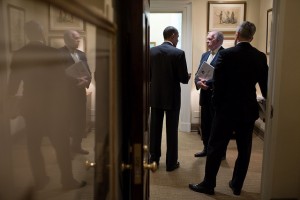Red-Teaming Abdulrahman al-Awlaki’s Assassination?
The Senate Intelligence Committee just released their Intelligence Authorization for next year. As part of it, they include “Targeted Lethal Force Reform.” Part of it — a useful part — requires the government to produce unclassified numbers on the total combatant and non-combatant deaths through targeted force (it exempts Afghanistan — though remains mute about Pakistan — and any new wars authorized by new Congressional authorizations).
But I’m even more interested in this.
(1) NOTIFICATION OF DIRECTOR.—Upon a determination by the head of an element of the intelligence community that a particular, known United States person is knowingly engaged in acts of international terrorism against the United States, such that the United States Government is considering the legality or the use of targeted lethal force against that United States person, the head of the element shall, as soon as practicable, notify the Director of the determination.
(2) INDEPENDENT ALTERNATIVE ANALYSIS.
(A) REQUIREMENT FOR ALTERNATIVE ANALYSIS.—Not later than 15 days after the date the Director receives a notification under paragraph (1), the Director shall complete an independent alternative analysis (commonly referred to as ‘‘red-team analysis’’) of the information relied on to support the determination made under paragraph (1).
It may be that SSCI put this into place to provide more “due process” to someone like Anwar al-Awlaki. And while that might have changed things back in December 2009, when they apparently tried to kill him before they believed him to be operational, it wouldn’t have changed things in the long run because his killing was so thoroughly discussed in at least 3 different Agencies of government.
Rather, this language would seem to prevent an Agency head — which, particularly giving confirmation of what I’ve been saying for years (that CIA would remain in charge of the drone campaign), means CIA — from killing someone without someone outside the Agency getting review.
Which is more like what happened to Abdulrahman al-Awlaki than his father. As Jeremy Scahill reported, John Brennan came to believe the 16 year old American citizen was purposely killed, though no one will release the report on the killing Brennan ordered.
The now-former SAO goes on to describe how pissed the Moral Rectitude Drone Assassination Czar John Brennan was about the strike, because he believed Abdulrahman was deliberately set up to be killed (though Scahill’s source doesn’t appear to specify whom Brennan thought was setting up an American teenager for death, JSOC, Yemeni partners, or the Saudis).
However, John Brennan, at the time President Obama’s senior adviser on counterterrorism and homeland security, “suspected that the kid had been killed intentionally and ordered a review. I don’t know what happened with the review.”
So Brennan sets up a review … that apparently got stashed in the same black hole as every other report on drone killing.
Yes, this language will provide a tiny modicum of protection to the Anwar al-Awlakis of the United States. But I’m far more interested in whether it’s an admission that Awlaki’s son could have been saved by a simple Red Team review.


